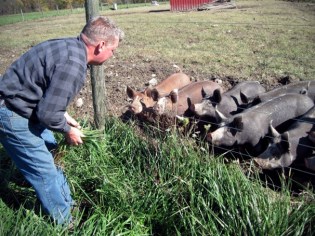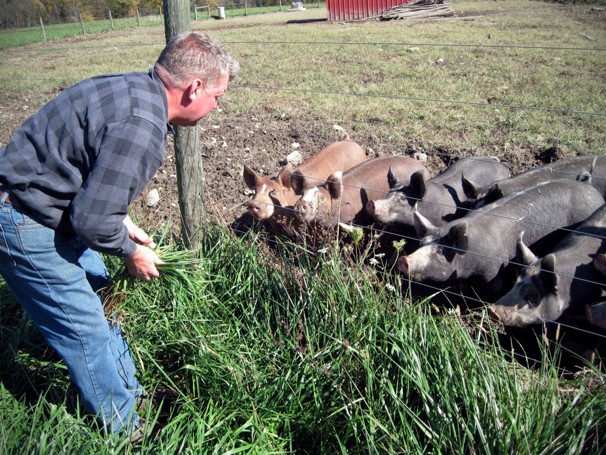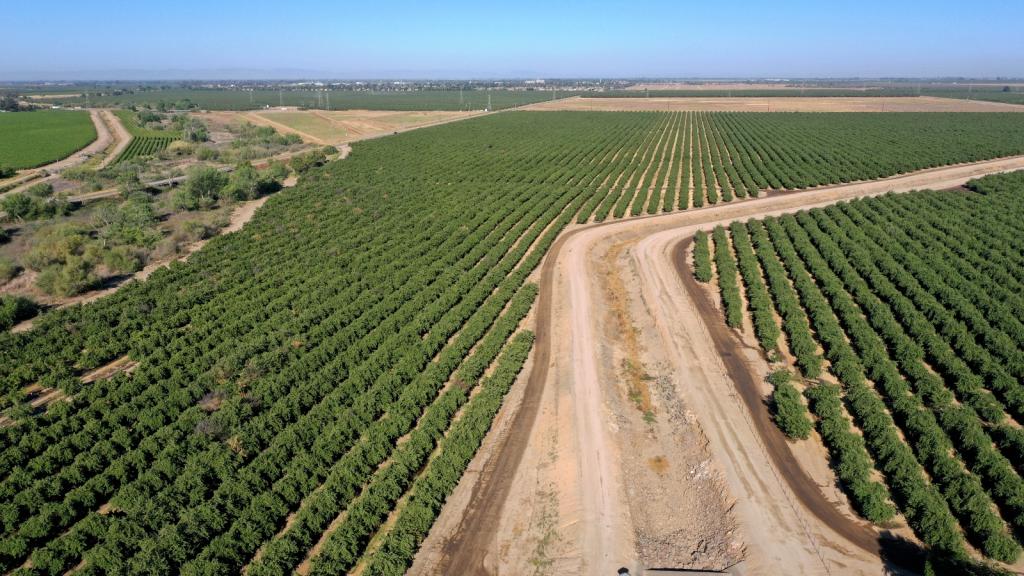
Aaron Miller of Miller Livestock in Kinsman, Ohio. Bon Appétit buys half of all his hogs. (Photo by Sarah Piper.)
Last week, McDonald’s announced it was making a move to end the use of gestation crates — the especially despicable practice of confining pregnant sows in spaces roughly the width of their bodies. By May, their announcement read, they’ve requested concrete plans from their producers to phase out the practice.
In other words, the company managed to make a splash in the news without committing to a timeline. Of course, one of McDonald’s biggest suppliers, Smithfield Foods, is supposedly four years into a 10-year process to phase out gestation crates by 2017 –- but it’s hard to know how much stock to put into their pledge considering the complaint filed by the Humane Society of the United States (HSUS) with the Securities and Exchange Commission in November alleging that Smithfield has been making false and misleading claims about their practices.
So, it’s refreshing to see that Bon Appétit Management Company (BAMCO) has promised to phase out pork produced in gestation crates, do away with all eggs from confined hens, and source at least 25 percent of their meat from farms that are third-party-certified humane by 2015. BAMCO isn’t nearly as large as McDonald’s, but they do run café and catering services for corporations, colleges, and universities in over 400 locations around the country, so a three-year timeline is not unambitious on their part. In fact, the company serves 3 million pounds of pork every year.
The announcement is in line with many of BAMCO’s efforts to change the food system on an institutional level, like their ongoing work to improve the lives of tomato workers with the Coalition of Immokalee Workers and other disenfranchised workers in the food chain, and their effort to raise awareness about the connection between food and climate change through their Low Carbon Diet.
Unlike many of the sea changes we hear about within today’s food companies, which are often spurred by consumer demand, BAMCO has a tendency to be more progressive than its customers. (Taking hamburgers off the menu on Low Carbon Diet Day and reducing beef purchasing by one-third are probably not the kinds of things you would do solely to please an American customer base, for instance.) But the latest change is actually the result of a long-standing beef with factory farms on the part of BAMCO’s CEO Fedele Bauccio, who has seen gestation crates and battery cages firsthand. From 2006 to 2008, Bauccio served on the Pew Commission on Industrial Farm Animal Production, a group that visited a number of concentrated animal feeding operations (CAFOs) and issued a now-famous report calling for the end of the most egregious practices they’d witnessed (including gestation crates).
“I’ve testified before Congress twice on the antibiotic issue, and that’s gone nowhere,” says Bauccio. “I’ve talked to the big CAFO owners and I said, ‘Change for us, create a new model, we’ll buy everything you can sell.’ But it lands on deaf ears. Finally, I just said, ‘Enough is enough.’”
Will there be sufficient product to meet BAMCO’s demands? Bauccio is crossing his fingers there will be — and he’s gone on record in a company press release saying that if humanely raised pork isn’t available in current quantities, BAMCO may just have to … serve less bacon.
“We’re going to have to create a network of regional small producers who raise animals this way,“ says Bauccio, who is not opposed to factory farms, per se, but to their practices. “They can’t do that overnight.”
The larger infrastructure around meat production also has a great deal of catching up to do — from slaughter and other processing facilities, which have become increasingly consolidated, to distribution. However, farmers and ranchers should take note: The demand for meat raised more humanely is clearly on the rise.
Melissa and Aaron Miller (pictured above) of Miller Livestock in Kinsman, Ohio, are a good example. They recently received the first humane certification in their state from Food Alliance — one of the four certifications BAMCO will accept, in addition to Animal Welfare Approved, Humane Farm Animal Care, or Global Animal Partnership. Bon Appétit buys half of all the hogs the Millers raise and “really pushed us to take it to the next level,” says Melissa Miller. “We would not have pursued it without their support. They even offered to reimburse us for the fees.”
“We have to go to [farmers] and say, ‘If you do this we’ll buy as much pork as you can produce,’” says Bauccio, “so they know that if they make these investments they’re not going to go out of businesses; they’ve got a built-in customer.”



